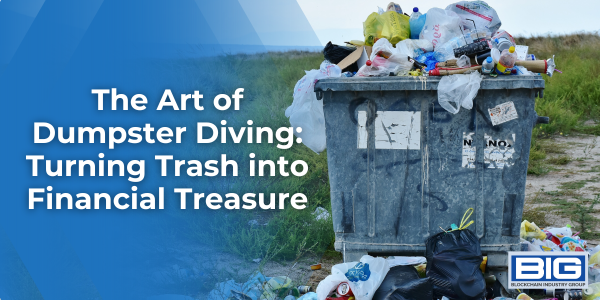
In a consumer-driven society where waste is rampant, some individuals have discovered a unique way to find hidden value in discarded items.
This article delves into the art of dumpster diving, exploring how resourceful individuals can turn trash into financial treasure through strategic scavenging, upcycling, and reselling.
The Allure of Dumpster Diving
Dumpster diving is the practice of searching through dumpsters and trash bins to find discarded items that still have value. What may seem like a dirty and unconventional activity to some is an opportunity for others to uncover perfectly functional items, valuable collectibles, or materials that can be repurposed. Dumpster diving not only offers the thrill of the hunt but also presents a sustainable and economical approach to acquiring goods.
Strategic Scavenging: Finding Diamonds in the Rough
Dumpster divers employ various strategies to maximize their chances of finding valuable items. They target specific locations known for discarding usable items, such as college campuses, apartment complexes, or retail store dumpsters. Timing is crucial, as diving after regular trash collection days often yields better results. By honing their observation skills and being mindful of what to look for, experienced divers can identify potential treasures amidst the discarded waste.
Example: Furniture and Electronics
Dumpsters behind furniture stores or electronics retailers can be a goldmine for dumpster divers. Many stores discard items that are slightly damaged, returned, or out of season but are still in excellent condition. With a keen eye and a little effort to repair or refurbish these items, divers can turn them into valuable assets, either for personal use or for resale.
Upcycling: Transforming Trash into Marketable Goods
One of the core principles of dumpster diving is upcycling, the process of repurposing discarded materials to create new and unique products. By harnessing their creativity and craftsmanship, divers can transform discarded items into one-of-a-kind pieces with aesthetic and functional appeal.
Example: Fashion and Accessories
Dumpster divers skilled in sewing and crafting can salvage fabric, leather, or other materials to create fashionable clothing, accessories, or home decor items. By repurposing discarded garments, they can breathe new life into these materials and offer sustainable alternatives to fast fashion.
Reselling: Monetizing Dumpster Finds
For some divers, dumpster diving is not just a hobby but a profitable endeavor. By carefully selecting valuable items and leveraging online platforms and local markets, they can turn their finds into financial gains.
Example: Vintage and Collectibles
Dumpster diving has become a popular way to find vintage and collectible items. Divers skilled in identifying valuable antiques, rare books, or limited-edition collectibles can sell these treasures to collectors or through online marketplaces. What may have been considered trash to others becomes a coveted item for passionate enthusiasts, allowing divers to earn a substantial profit.
The Ethical and Legal Considerations
While dumpster diving can be a rewarding pursuit, it is important to be aware of ethical and legal boundaries. Divers should respect private property, adhere to local regulations, and prioritize safety. It is essential to obtain permission when diving in commercial areas and exercise caution to avoid personal injury or property damage.
Saving for College: A Guide to Covering Education Costs
—
The Art of Budgeting and Money Management
—
The Art of Extreme Couponing: Unleashing the Power of Penny-Pinching
Dumpster Diving Etiquette: Leave No Trace
Dumpster divers should practice responsible scavenging by leaving the diving area clean and organized after their search. Reseal bags and containers properly, and dispose of any trash generated during the process. This respectful approach promotes positive relationships between divers and businesses or property owners.
Dumpster diving is a fascinating and unconventional practice that allows resourceful individuals to turn trash into financial treasure. It showcases the potential for sustainable living, creative upcycling, and even profitable resale. By strategically scavenging, upcycling discarded materials, and reselling valuable finds, dumpster divers are redefining the concept of waste and demonstrating the power of ingenuity in a consumer-driven society. While ethical considerations and legal boundaries must be respected, the art of dumpster diving continues to inspire individuals to explore alternative avenues for acquiring goods and contributing to a more sustainable future.
Note: Dumpster diving may not be legal in all jurisdictions, and it’s important to research and adhere to local laws and regulations before engaging in this activity.



